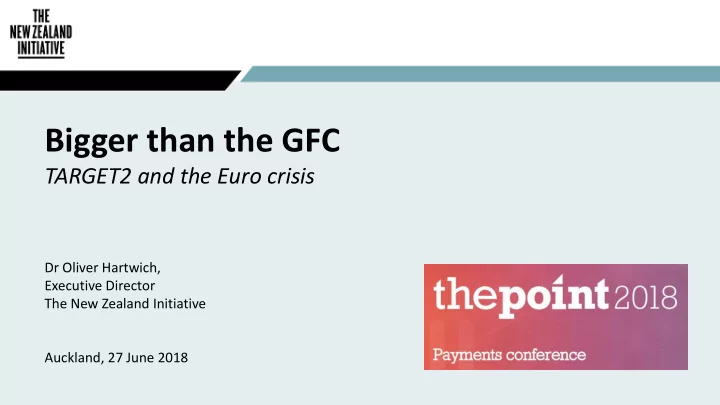

Bigger than the GFC TARGET2 and the Euro crisis Dr Oliver Hartwich, Executive Director The New Zealand Initiative Auckland, 27 June 2018
Do we really need to talk about Europe again?
Do we really need to talk about Europe again? • The Euro crisis has disappeared from the front pages. • The Greek bailout programme is coming to an end. • The ECB will stop its bond-buying programme in December. • Eurozone GDP growth forecast to reach 2.5 percent in 2018. • Eurozone unemployment at 8.5 percent (down from a peak of 12.1 percent in 2013). So the Euro crisis is over, or is it?
TARGET2: The hidden side of the Euro crisis • 2011: Discovery of a hidden ECB bailout mechanism by German top economist Hans- Werner Sinn. • Trans-European Automated Real-time Gross Settlement Express Transfer System, short: TARGET2. Hans-Werner Sinn
TARGET2: The hidden side of the Euro crisis ECB definition: “TARGET2 settles payments related to monetary policy operations, interbank and customer payments, and payments relating to the operations of all large-value net settlement systems and other financial market infrastructures handling the euro (such as securities settlement systems or central counterparties).”
TARGET2: The hidden side of the Euro crisis • TARGET2: An ordinary clearing mechanism between the Eurosystem’s banks. • But what should that have to do with the Euro crisis? • It’s highly complicated … so let’s first explain what is going on in Europe with a metaphor.
What Monopoly can teach us about the Eurozone
Some stylised facts about intra-European trade Before the introduction of the Euro: • Differences in competitiveness resulting in frequent exchange rate adjustments. • No significant or persistent trade imbalances. After the introduction of the Euro (1999): • Fixed exchange rates requiring different adjustments to competitiveness divergences. • Development of substantial trade imbalances.
Monetary adjustments before the Euro France Italy Spain UK US 100 FRF 1000 ITL 100 ESP 1 GBP 1 USD 1963 81.36 DM 6.41 DM 6.65 DM 11.16 DM 3.99 DM 1998 29.82 DM 1.01 DM 1.18 DM 2.91 DM 1.76 DM Devaluation -63.3% -84.2% -82.3% -73.9% -55.9%
German exports unleashed by the Euro
French exports crippled by the Euro
The Euro competitiveness gap Unit labour costs (2000=100%)
But what did Germany receive in return for its exports?
But what did Germany receive in return for its exports? Bundesbank assets (Euro million) 31-Dec-06 31-Dec-17 Gold and gold receivables 53,114 117,347 Claims on non-euro-area residents denominated in foreign currency 31,651 49,495 Claims on euro-area residents denominated in foreign currency 0 7,168 Claims on non-euro-area residents denominated in euro 300 4,396 Lending to euro-area credit institutions related to monetary policy operations denominated in euro 256,348 94,320 Other claims on euro-area credit institutions denominated in euro 3,049 464 Securities of euro-area residents denominated in euro 0 512,125 Claims on the Federal Government 4,440 4,440 Intra-Eurosystem claims 18,273 919,183 Items in course of settlement 1 2 Other assets 6,360 18,688 Total assets 373,536 1,727,628
TARGET2 creditors and debtors
So what happened in 2007?
A TARGET2 example Greek TARGET2 Greek farmer Greek commercial bank Greek central bank liability towards the ECB European central bank German TARGET2 claim against the ECB German central bank German commercial bank German manufacturer
TARGET2 in a nutshell • Through TARGET2, the ECB maintained existing trade imbalances and new payment imbalances since the Global Financial Crisis. • TARGET2 creditors, mainly Germany, built up large claims against the rest of the eurozone. • Germany’s export surpluses were largely financed by its own central bank, the Bundesbank. • None of this is a problem … as long as the Euro exists.
TARGET2 could destroy the Bundesbank
TARGET2 could destroy the Bundesbank
TARGET2 could destroy the Bundesbank Claudio Borghi , Lega’s economics spokesperson and chair of the Italian Parliament’s budget committee, quoted in The Daily Telegraph , 21 June 2018: Mr Borghi, a former trader at Deutsche Bank, said the best solution for everybody is for Germany to leave the eurozone. If Germany refuses to do so, he argues that Italy can pass a law converting its debt obligations into florins or lira overnight. “The losses would shift to the national central banks through the Target2 system,” he said. Bank of Italy would repay € 440bn of liabilities to the ECB in devalued coin under the principle of Lex Monetae.
We need to talk about Europe again • Despite the Eurozone’s recovery, severe risks remain. • A TARGET2 implosion would be triggered by any country leaving the Eurozone. • It would require an enormous recapitalisation of the Bundesbank and could wreck the (fragile) German banking system. • And it would make the Germans realise what their past trade surpluses were really worth. • Germany plays Monopoly just as I did when I was a child.
Thank you Dr Oliver Hartwich oliver.hartwich@nzinitiative.org.nz www.nzinitiative.org.nz
Recommend
More recommend